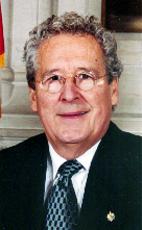Mr. Speaker, I am pleased to rise today to take part in this extremely important debate on respecting Canada's linguistic duality in health care.
Many hon. colleagues have spoken, and opinions vary. My colleague, the hon. member for Charleswood—St. James—Assiniboia, talked about what Bill C-202 means to Manitobans. I would like to talk about the implications of this legislation for Franco-Ontarians.
The community I represent is very familiar with the debate on linguistic rights and health care. I would even say they are all too familiar with it. Most of my hon. colleagues know that Franco-Ontarians have had to fight tooth and nail over the past six years to assert their rights in health care. I am talking, naturally, about Montfort.
We learned a lot during the Montfort saga. I can only hope that the memory of this fight will force us to recognize the importance of Bill C-202. We cannot take our linguistic rights for granted: we must constantly defend them. We must be vigilant. We must add the sixth principle, to respect linguistic duality, to the Canada Health Act.
I want to repeat the chronology of events in the Montfort saga to illustrate the importance of learning from the past.
Six years ago, in February 1997, the Ontario Health Services Restructuring Commission announced the closure of the Montfort Hospital, Ontario's only French language university hospital. Imagine the impact of that decision on the francophone community: no more hospital for francophones; no more on-the-job training for our health care professionals. From now on, everything would be done in English, would be translated, or would be done elsewhere than in Ottawa. This was a disastrous decision for our community.
Fortunately, the Franco-Ontarian community was quick to react. On March 22, 1997, one month after the commission's decision, that community rallied and unanimously asked the commission to reverse its decision. More than 10,000 people attended the rally to make their views known. The S.O.S. Montfort campaign had been launched just a few weeks earlier, but it was going full steam ahead with its slogan “Montfort, fermé: Jamais!”.
Later that year, the commission reversed its decision, but it did not do so in good faith. According to the new decision, Montfort would remain open, but several of its essential services, including emergency and special services, would be eliminated. This was, of course, unacceptable. Discussions continued for a year, without success. Finally, in August 1998, the community, represented by S.O.S. Montfort, went to court to plead its case.
Like every other Franco-Ontarian, I was glad to hear, in November 1999, that the courts had ruled in favour of Montfort. The Divisional Court of Ontario recognized that the closure of the Montfort hospital was unconstitutional. It was our first victory. I call it our “first” victory, because the Government of Ontario did not agree with the ruling and appealed it. Imagine. Ontario appealed the ruling. The community had to take up the fight again.
The Franco-Ontarian community persevered. There were great disappointments and memorable victories. It kept asserting its rights and was finally successful. On December 7, 2001, the Court of Appeal for Ontario confirmed the ruling handed down in November 1999.
Two months later, the Ontario government announced that it would not appeal that ruling. The Montfort hospital would not close its doors. Franco-Ontarians would maintain their right to health services in the official language of their choice.
The fight to keep Montfort has been long and hard. Let us keep that in mind. Why do we need to fight such battles to protect a right enshrined in the Constitution of our country, in the Canadian Charter of Rights and Freedoms?
There is one lesson to be learned from the battle over Montfort. We cannot rely on the government's good intentions. We need guarantees enshrined in the law of the land. As parliamentarians, we have to protect our official language communities. We need to add a sixth principle to the Canada Health Act, that of respecting Canada's linguistic duality in the delivery of health care services.
Let us vote in favour of Bill C-202.

